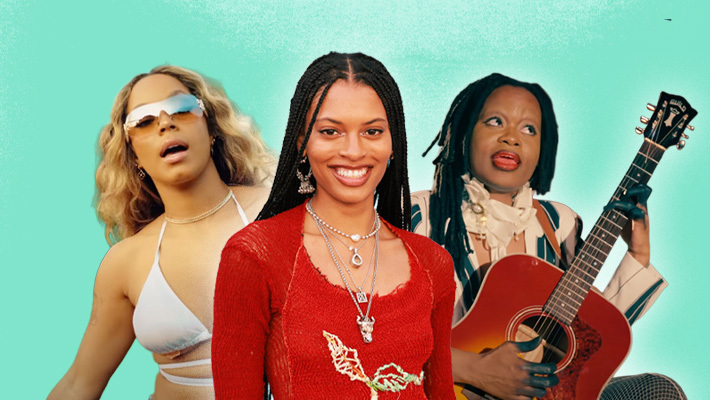-
 play_arrow
play_arrow
DisnDat HITZ DisnDat HITZ
-
 play_arrow
play_arrow
Warlando Hitz Warlando Hitz
-
 play_arrow
play_arrow
DisnDat Tunez Reggae,Dancehall and Afro Beats
-
play_arrow
Allow Us to Re-Introduce Ourselves
Last month, while presenting the award for Favorite Country Duo or Group at this year’s American Music Awards, two burgeoning country stars — both playing homage to the storied genre, made headlines. As Megan Maroney, the blonde up-and-comer who often answers to “Emo Cowgirl” gave Shaboozey, fellow Country crooner known for his chart topping track “A Bar Song (Tipsy)” that mixes country and rap — a quick music history lesson, sharing a story of the how the Carter Family won Favorite Country Duo or Group in 1974. She ended her story by giving them credit, where it perhaps wasn’t due, saying they “basically invented country music.” He gave her a side eye so fierce for the comment that the internet noticed. Later, he explained, while defending Maroney, the reason for his reaction. “When you uncover the true history of country music, you find a story so powerful that it cannot be erased,” he shared via Twitter. It’s a sentiment many Black artists like Shaboozey have attempted to share as they navigate the world of American roots music, a sound made up of decades of blues, bluegrass, folk, gospel, and country.
Since the advent of radio, Black artists have been categorized by their race rather than their sound. In a segregated system that was more concerned by marketing to white people vs. Black people, and choosing which airwaves songs would play based more on physical characteristics than sound, it’s no surprise that it’s taken until 2025 for an artist like Beyoncé to become the first Black woman to win the Grammy for Best Country Album. But the truth is that people across races have been creating American roots music since the African rhythms, call-and-response vocals, and the banjo (which has African origins), blended together with the fiddles and ballads of Britain and Ireland, with Native American musicianship and storytelling. It’s a genre that is chiefly American, and although people may assume it was created by those who had the platforms to speak about it during their time (*cough* The Carter Family *cough), it would not have been and could not have been created anywhere other than the sonic melting pot of this country.
Still, even in 2025, though the face of these genres are changing, many Black singers and songwriters have yet to experience success, thanks in part to the subconscious and industry-created bias that they ‘don’t belong’ in certain genres. Because of this, we’re sharing the names and music of just a few of those artists you should watch, but more importantly, listen to. Here are Black roots artists that are breaking the rules of genre and reclaiming the sound that has always been theirs.
Annahstasia
When LA-based singer-songwriter Annahstasia first wrote songs that paid homage to the sounds she’d grown up with, a mix of folk with jazz training, she was immediately told to pivot to pop. Her deep, resonating voice and storytelling ability through song came naturally to the singer at a young age, but as she met with record executives, she found that her instincts and their intent for her didn’t match. “It was disheartening,” she told NME. “Imagine showing up to a space and being like, ‘This is me.’ And someone saying, ‘Ew.’ It doesn’t feel good.” Lucky for us, she persevered, bringing her songs on global tours opening for the likes of Lenny Kravitz and releasing a debut album filled with poetry, soul, and of course, folk instrumentation. Her latest album, Tether, promises more from the artist, as she pushes against capitalism, leans into self-revelations, and mingles romantic prose with sharp declarations in a move that not only reclaims the genre but allows her as an artist to reclaim herself.
Cleo Reed
New York City’s Cleo Reed has been making a name for herself, combining Black Southern folk and delicate guitar playing to create their own fresh version of roots music. Classically trained in guitar and songwriting at Harlem School of the Arts before joining a punk band (NYC’s Pretty Sick) to releasing their debut album Root Cause in 2023, they’ve relied very little on categorization of their sound and more so into what makes folk music what it is — a means for holding the powerful accountable and documenting lived realities. Her recent single “Always The Horse, Never The Jockey,” embodies the genre’s political core. “It is a harrowing realization to notice and understand that the systems seen in the United States are intentionally designed to fail us,” she said of its inspiration in a statement. “Each day, I’ve seen who chooses to ride right past the dysfunction in search of industry. I can’t help but admit that I feel more in relation to the horse itself than the jockey.” With a new album on the way and a penchant for timely tracks, Cleo Reed’s impact is promising.
Tanner Addel
Country has long been the home of bleached blondes with oversized hair and songs about heartbreak (thank you Dolly Parton!), but those designations have rarely been allocated to Black women in the genre, if they were in the genre at all. Enter, Tanner Addel, who has come into pop country embracing all aspects of herself and telling stories she could only tell. Earlier this year, she released “Going Blonde,” which tells her adoption story, and what drew her to embracing the same color of locks as her mom, whom she never met. She’s already played a sold-out headline tour, manifested a collaboration with Beyoncé on Cowboy Carter’s “BLACKBIRD,” and has continued to amass “buckle bunnies” who, like her, embrace the Country lifestyle they’ve grown up on. And although she’s said that Country has had a hard time evolving, her rise to fame is clearly pushing it in the right direction.
Written by: dev
Similar posts
-
Recent Posts
- What Are The Chances Of That? Driver Suffering Heart Attack Crashes Into Cardiologist's Office!
- Court Cam: Woman Refuses To Pay Fine After Honking At A Cop, Then Clashes With Judge!
- Intense Shootout Erupts After Officer Confronts Stolen Car Suspects!
- Candace Owens Claims The Media Is Falsely Portraying Tyler Robinson As Suicidal, Says The FBI Is Lying About The Charlie Kirk Shooting!
- Young Thug Says He'd Feel Like 'Less Of A Man' If His Girl Got A Therapist: 'You'd Listen To Them Over Me?!'
Recent Comments
Featured post

Latest posts

What Are The Chances Of That? Driver Suffering Heart Attack Crashes Into Cardiologist's Office!

Court Cam: Woman Refuses To Pay Fine After Honking At A Cop, Then Clashes With Judge!

Intense Shootout Erupts After Officer Confronts Stolen Car Suspects!

Candace Owens Claims The Media Is Falsely Portraying Tyler Robinson As Suicidal, Says The FBI Is Lying About The Charlie Kirk Shooting!

Young Thug Says He'd Feel Like 'Less Of A Man' If His Girl Got A Therapist: 'You'd Listen To Them Over Me?!'
Current show

Hipster Morning
With Jack M.
For every Show page the timetable is auomatically generated from the schedule, and you can set automatic carousels of Podcasts, Articles and Charts by simply choosing a category. Curabitur id lacus felis. Sed justo mauris, auctor eget tellus nec, pellentesque varius mauris. Sed eu congue nulla, et tincidunt justo. Aliquam semper faucibus odio id varius. Suspendisse varius laoreet sodales.
closeUpcoming shows

KING TALK
11:00 am - 1:00 pm

DISNDAT VIBES
Every Afternoon With You!
1:00 pm - 3:00 pm
Frequency One
Mixed by Dj Monster
3:00 pm - 11:40 pm
Pop’n Roll
Mixed by Rebecca Lost
11:40 pm - 11:55 pm
Orlando Sessions
Presented by DISNDAT
11:55 pm - 12:00 amChart
-

Hipster Morning
With Jack M.
For every Show page the timetable is auomatically generated from the schedule, and you can set automatic carousels of Podcasts, Articles and Charts by simply choosing a category. Curabitur id lacus felis. Sed justo mauris, auctor eget tellus nec, pellentesque varius mauris. Sed eu congue nulla, et tincidunt justo. Aliquam semper faucibus odio id varius. Suspendisse varius laoreet sodales.
close Chart
-
1
play_arrowAdd It Up (feat. Luh Tyler & Scy Jimm)
Ratxhet
-
2
play_arrowPpp
Sawcegawdclutch
-

3
play_arrowFlorida Water (feat. Luh Tyler)
Danny Towers, Dj Scheme & Ski Mask The Slump God
-
Top popular
Quick links
Our radio.
COPYRIGHT All rights reserved.
Site Design by Superior Business Solutions.









